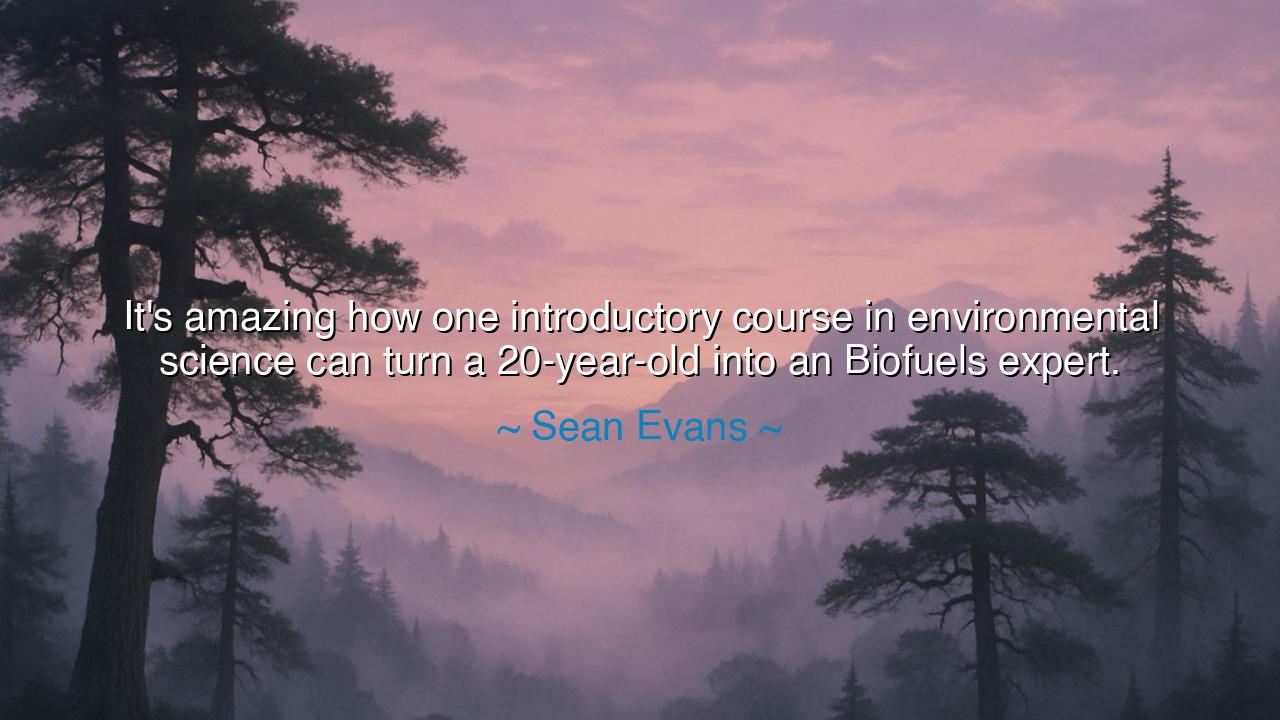
It's amazing how one introductory course in environmental science
It's amazing how one introductory course in environmental science can turn a 20-year-old into an Biofuels expert.






In the words of Sean Evans: “It’s amazing how one introductory course in environmental science can turn a 20-year-old into a biofuels expert.” Though spoken with irony, these words reveal a timeless truth: that knowledge lightly held can breed arrogance, and that wisdom is not gained in a single lesson, but through patience, humility, and experience. The quote is not a dismissal of youthful passion, but a reminder that the journey from ignorance to understanding is long, and that one must not mistake the first step for the summit of the mountain.
The ancients warned often of the dangers of half-knowledge. Socrates himself declared that the wisest man is the one who knows that he does not know. For when the young taste the first sweetness of learning, they often believe they have mastered the banquet, forgetting that true mastery comes not from tasting alone, but from years of careful nourishment. Evans, with a wry smile, points to this human tendency: to mistake the introductory course for expertise, to wear the crown of knowledge before the battle has even begun.
Consider the tale of medicine in the Middle Ages. Many who studied only a single text or a handful of remedies proclaimed themselves healers, but their ignorance often harmed rather than cured. Yet those who gave their lives to study, who observed, practiced, and refined, became the true physicians who advanced the art. In the same way, the study of biofuels—a field complex and vast, involving chemistry, economics, agriculture, and environmental stewardship—cannot be mastered in a single classroom, but requires long apprenticeship, experimentation, and reflection.
And yet, the passion of the young is not to be scorned. The spark of enthusiasm lit by that first course in environmental science can ignite a lifetime of dedication. Many great reformers began with but a taste of truth, which drove them to seek more, to study deeply, and to act boldly. The danger lies not in the passion itself, but in the illusion that passion alone is sufficient. True wisdom is born when zeal is tempered with humility, when the young mind says: “I have begun to learn, but I will keep learning.”
Evans’s words also carry a warning for society. In an age of quick information and shallow consumption, many speak with the confidence of experts after reading only an article or watching a single lecture. This is not new—Plutarch lamented in his time that men of little study boasted as philosophers. But in matters as grave as environmental science and climate change, such shallow expertise can mislead others, spreading not light but confusion. A false teacher is more dangerous than an ignorant man, for he wears the cloak of authority without its substance.
The lesson, then, is twofold: for the student, humility; for the teacher, patience. The student must remember that knowledge is a river, not a well, flowing endlessly and requiring a lifetime to drink. The teacher must guide gently, encouraging enthusiasm while reminding the learner that true understanding demands depth, perseverance, and practice. Together, they preserve the integrity of knowledge, ensuring that the great work of science is not trivialized into slogans, but honored as a lifelong calling.
So let this teaching endure: do not mistake the first step for the journey’s end. Rejoice in the spark of learning, but feed it with diligence, with humility, and with years of practice. If you are young, let your passion for biofuels, for science, for the healing of the earth, drive you to deeper study. If you are older, guide the young with patience, and show them that wisdom is a path walked slowly. For in this balance of zeal and humility lies the hope of progress—not in false experts born overnight, but in true stewards formed over a lifetime.






AAdministratorAdministrator
Welcome, honored guests. Please leave a comment, we will respond soon